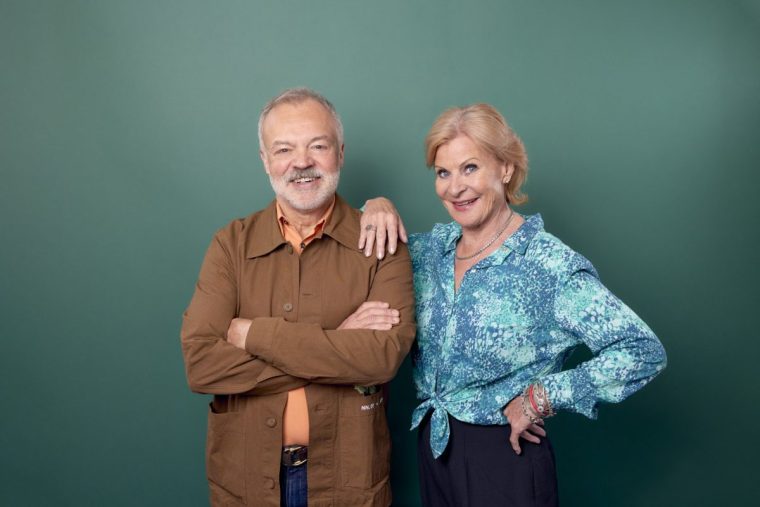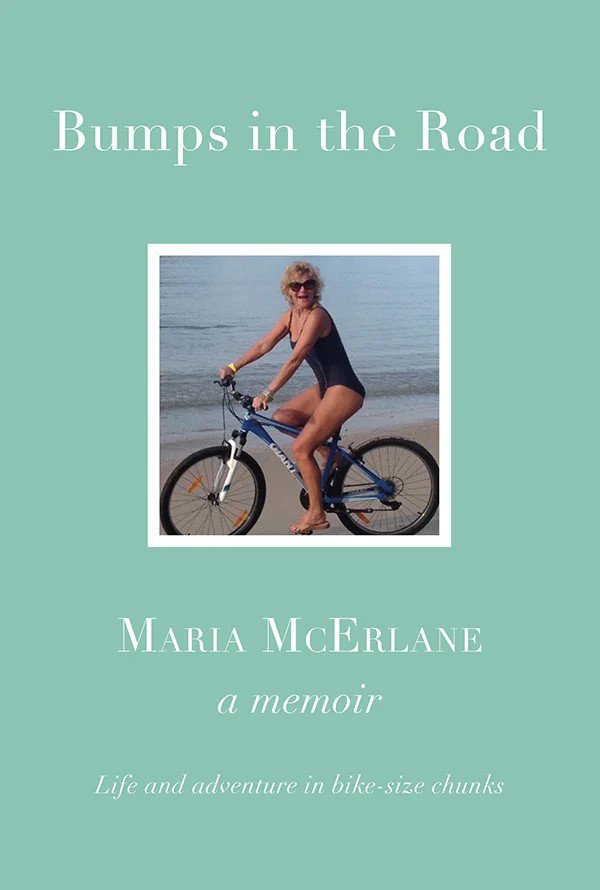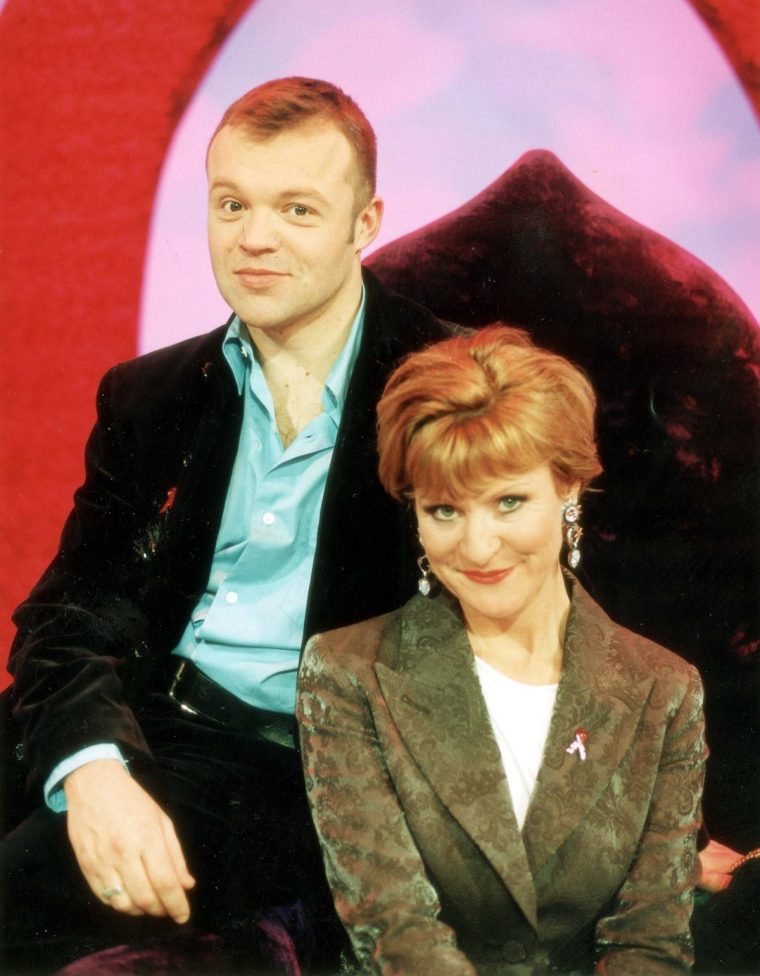“Who’s that frightening old crone?” Comic and presenter Maria McErlane, 67, is talking about public reception so far for Wanging on with Graham & Maria, the deliciously caustic new advice podcast she hosts with Graham Norton, her friend of more than 30 years. There are many positives, but the filmed aspect isn’t quite one of them. “I mean, I don’t have hair and make-up, and the lighting isn’t good, but f**k it. At this point, you’re the age you are, and you’re not fooling anyone. It’s time to liberate ourselves from worrying about all of that. We’ve also been called ‘two know-it-all corpses’.”
Each week, the pair dispense hilarious and often brutal replies to listeners who write in with personal problems. For instance, Hal from Derby writes to say he is embarrassed about introducing his fiancée to his mother and stepfather, owing to the multiple nude paintings of his mum that decorate their house, and which his mother has declined to remove. Rather than sympathise with Hal, McErlane and Norton wonder why he can’t simply have a laugh with his intended about the art instead. “I’m with your mum on this, Hal,” concludes McErlane. “Get over yourself and put your big boy pants on.”
The McErlane-Norton double-act goes back years. McErlane used to make frequent appearances on Norton’s weekend show on BBC Radio 2, which came to an end after a decade in 2020. After that, they co-presented a show on Virgin Radio but left after three years because Norton “wanted his weekends back”. While they were off air, listeners kept pestering them on social media to do a podcast, and eventually they gave in.

McErlane enjoys the freedom of podcasting where they can say what they like and swear like sailors. “On radio, we were more constricted. At the BBC, we did get in trouble quite a lot,” she says over video call from her home in Hastings, East Sussex. “We were both called in by the boss man separately after we said things [about Trump] during the 2017 Women’s Marches. The BBC was rigorous with its censorship, but now we can say ‘bum’ and ‘bugger’ and do what we like.”
Over the years, McErlane has worked as an actor – she has had modest parts in EastEnders, Holby City, Fat Friends, and most recently, Killing Eve – as well as a presenter, stand-up, writer and voiceover artist (she was the voice of the racy post-pub comedy Eurotrash in the 90s). She is currently writing a novel, a parable about modern life called No Good Turn. It will be McErlane’s second book after last year’s memoir, Bumps in the Road, in which she joyously describes her job as “mucking about”. That, she says, is her way of saying “I don’t want to be pigeonholed, because I like doing all of it. And I’ve made a good living out of it, too.”
McErlane grew up in Bletchley in Buckinghamshire, the child of Catholic working-class parents whose lives mostly revolved around going to church. In her early teens, she lost interest in education; for three months she didn’t attend school at all, instead spending her days riding around on buses and daydreaming.
At 16, she went to work at the Tetley Tea factory, but “like so many people in a small town, I just had to get out”. Her exit plan arrived via a summer job as a chambermaid at a hotel in Newquay, Cornwall. “I got the education that I should have had at school. I was such a bumpkin at the time. I was a virgin and knew nothing about life.” Most shocking to her was the state in which people left their rooms, smothered in bodily fluids and sex toys. “I had no idea people lived like that, especially people who could afford to stay in a nice hotel.”
After two summers in Newquay, she moved to London, where she underwent total reinvention. “I think it was a survival mechanism and not wanting to be judged. But also I didn’t yet know who I was and who I wanted to be.” She got a job answering phones at a film production company, Hemdale Films, run by actor David Hemmings and producer John Dale. At 20, she applied for a discretionary grant and got into drama school.

It was during this period that McErlane struggled with body dysmorphia and disordered eating. She would binge on chocolates and sweets, which would make her put on weight. “Then I would stop eating everything, which obviously isn’t sustainable as I would feel weak and wobbly and ill. It was a vicious cycle of starve, binge, starve, binge.” McErlane adds that she “doesn’t know a single person of my generation that hasn’t had issues around food, which is a tyranny, and it’s still going on”. She says: “Because now, of course, we have Ozempic, so even people who are only nine stone can get down to seven.”
In the late 80s, McErlane began dabbling in live comedy, sharing stages with Jo Brand, Jack Dee and Jenny Eclair, and deliberately “poshing up” her voice in order to stand out from the crowd. She performed under the name Maria Callous, but ultimately found herself more comfortable as a compère than doing 30 minutes in “the bear pit”.
In those days, she notes, comedy “was populated by oddballs and misfits”. At the Tunnel Club in London, she observed audiences humming at comics to show their displeasure; the more they disliked a performer, the louder the humming got until they were drowned out entirely. “It was really horrible. People are much kinder these days. You can go and talk about your ADHD diagnosis or your neurodivergence, and everyone will listen. Then it was just jokes, jokes, jokes. And if you were a woman, they would shout, ‘Show us your tits’.”

It was on the comedy circuit that McErlane met Norton in the early 90s. When she got a job hosting the late-night TV game show Carnal Knowledge in 1996, about couples and their sex lives, she suggested Norton as co-host. “He’s got me to thank for his entire career!” she hoots. The pair became fast friends, “propping each other up when we thought our careers were over and we’d never work again. He’s seen me through lots of trauma and heartache and vice versa.”
She counselled Norton during his rise to fame, “which was sudden and immense”. She applauds her friend and his ability to maintain a career in the spotlight while never becoming the headline himself. “He’s clever, you see, as he’s the chat show host and therefore he’s conducting the orchestra. No one thinks to ask about him.” She believes that, when it comes to handling fame, Norton has it licked. “And being his pal, I get to enjoy all the perks without the nasty bits. Which I think we can agree is a win.”
McErlane got her first taste of fame on The Fast Show in 1994, the much-loved comedy series where she starred alongside Paul Whitehouse and Charlie Higson. But when people began approaching her in the supermarket and asking for her autograph, she felt uncomfortable and exposed. Why? “I just felt I was never enough in real life. I’ve since understood that what affects people when they’re famous is that they believe the hype. I didn’t believe the hype, so I never lost the run of myself, as my Irish granny used to say. But I think there’s a price to pay.”
McErlane can recall friends in comedy who would perform and “be loved by an entire auditorium” and then go home and be assailed by loneliness. “A lot of people in comedy have issues, and [the profession] magnifies them. I was just watching a documentary about [the late Friends actor] Matthew Perry, and I thought, ‘I get it’. He had everything he wanted, and it didn’t fill the hole. It’s lonely up there on Planet Fame.”
New episodes of Wanging On are available every Monday
